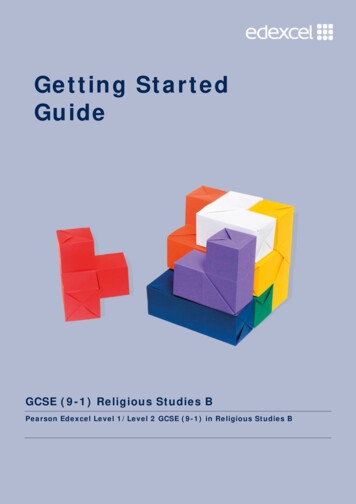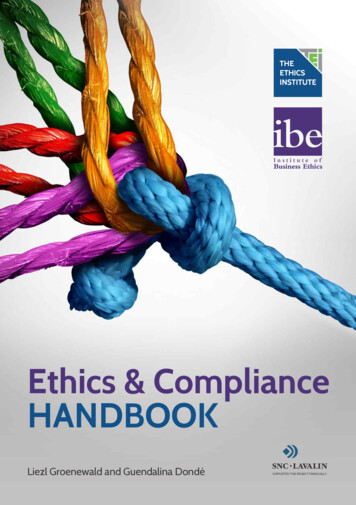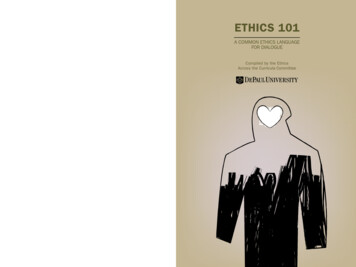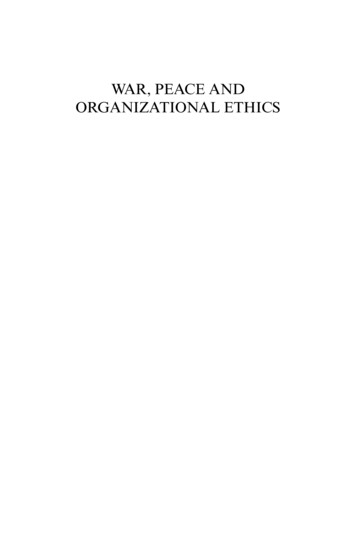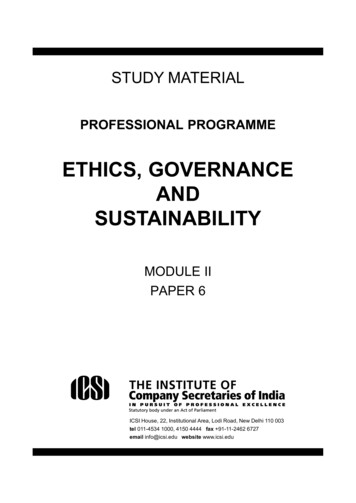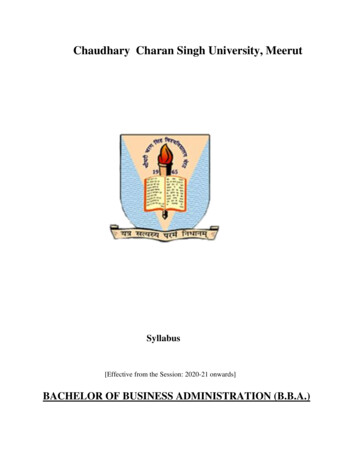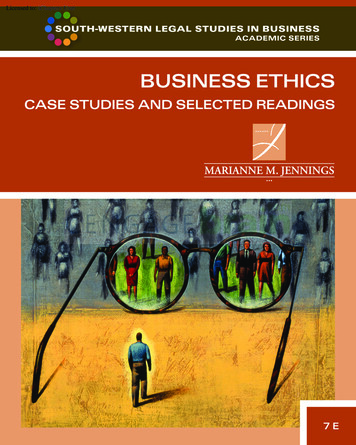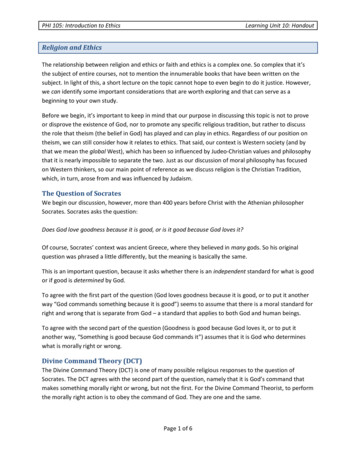
Transcription
PHI 105: Introduction to EthicsLearning Unit 10: HandoutReligion and EthicsThe relationship between religion and ethics or faith and ethics is a complex one. So complex that it’sthe subject of entire courses, not to mention the innumerable books that have been written on thesubject. In light of this, a short lecture on the topic cannot hope to even begin to do it justice. However,we can identify some important considerations that are worth exploring and that can serve as abeginning to your own study.Before we begin, it’s important to keep in mind that our purpose in discussing this topic is not to proveor disprove the existence of God, nor to promote any specific religious tradition, but rather to discussthe role that theism (the belief in God) has played and can play in ethics. Regardless of our position ontheism, we can still consider how it relates to ethics. That said, our context is Western society (and bythat we mean the global West), which has been so influenced by Judeo-Christian values and philosophythat it is nearly impossible to separate the two. Just as our discussion of moral philosophy has focusedon Western thinkers, so our main point of reference as we discuss religion is the Christian Tradition,which, in turn, arose from and was influenced by Judaism.The Question of SocratesWe begin our discussion, however, more than 400 years before Christ with the Athenian philosopherSocrates. Socrates asks the question:Does God love goodness because it is good, or is it good because God loves it?Of course, Socrates’ context was ancient Greece, where they believed in many gods. So his originalquestion was phrased a little differently, but the meaning is basically the same.This is an important question, because it asks whether there is an independent standard for what is goodor if good is determined by God.To agree with the first part of the question (God loves goodness because it is good, or to put it anotherway “God commands something because it is good”) seems to assume that there is a moral standard forright and wrong that is separate from God – a standard that applies to both God and human beings.To agree with the second part of the question (Goodness is good because God loves it, or to put itanother way, “Something is good because God commands it”) assumes that it is God who determineswhat is morally right or wrong.Divine Command Theory (DCT)The Divine Command Theory (DCT) is one of many possible religious responses to the question ofSocrates. The DCT agrees with the second part of the question, namely that it is God’s command thatmakes something morally right or wrong, but not the first. For the Divine Command Theorist, to performthe morally right action is to obey the command of God. They are one and the same.Page 1 of 6
PHI 105: Introduction to EthicsLearning Unit 10: HandoutIf God requires a certain action, such as “honor your father and mother,” then this makes it a moralrequirement. If God prohibits a certain action, such as “you shall not steal,” then to perform that actionis morally wrong. If, however, an action is neither required nor prohibited by God, then it is consideredmorally permissible.(For our discussion, please note that a theist is someone who believes in God, while an atheist issomeone who does not believe in God. The prefix “a” means “no” or “not.”)From a theistic perspective, the Divine Command Theory can be appealing because it appears to protectGod’s sovereignty or position as the Supreme Being. Nothing, not even objective moral standards, hold ahigher position of authority than he does.However, for some theists and, of course, atheists, the Divine Command Theory presents someproblems. Perhaps the most significant of these is that it appears to propose a situation where God canestablish moral standards based on random choice or personal whim, rather than any particular reason.For example, opponents of the Divine Command Theory ask whether God could establish lying as amoral standard.The Independence ThesisIn contrast to the Divine Command Theory, the independence thesis sees objective moral standards asexisting independently from God’s commands. In other words, while God’s commands may be morallyright, they are morally right not only because they are God’s commands, but because they agree with anobjective moral standard that is separate from them.Atheists would certainly agree with the independence thesis, because if one doesn’t believe in God,then, of course, one would not believe that moral standards are dependent upon him. However, theindependence thesis is not inherently atheist. In other words, many theists also agree with theindependence thesis.While theists who agree with the thesis are saying that there are independent moral standards, theymight also assert that due to God’s unlimited and complete knowledge (omniscience), he knows andunderstands these objective moral standards better than we do, and can, therefore, guide us to a fullerunderstanding of them through, for example, his Holy Scriptures and commands. In other words, oneneed not agree completely with the Divine Command Theory in order to be a theist.A False Dichotomy?The question posed by Socrates may present a false dichotomy (or false dilemma) in that it forces us tochoose between two options, but these are not the only options available to us.For example, the religious context of Socrates was ancient Greece, which held that there were manygods who amounted to little more than “super-powered” humans. A survey of Greek mythology revealsgods who regularly engaged in the same immoral behaviors as their human counterparts. Apart fromtheir having more power, there was little difference, and they certainly weren’t presented as models ofmoral goodness. The Judeo-Christian understanding of God is radically different.Page 2 of 6
PHI 105: Introduction to EthicsLearning Unit 10: HandoutThe question asked by Socrates assumes that “the Good” is something separate from God. It either gainsits value from God’s choice of it, or it stands apart from God, as its own standard. In either case, it stillexists as separate from God.However, the Christian Tradition understands God not just as the creator of the universe and humanbeings, but actually the Source of all that is – he is understood as being itself – nothing exists apart fromhim. See, for example, Acts 17:16-31, and especially verse 28, which says, “For in Him [God] we live andmove and have our being.” If this is the case, then asking whether something is good because Godapproves of it or if he approves of it, because it’s good in itself would make no logical sense, becauseboth options assume the Good is something that exists on its own, apart from God. Rather, God Himselfis “the Good.” In other words, there can be no “Good,” let alone anyone to acknowledge it, apart fromGod, since nothing exists apart from God, as he is the source of all being or existence. Again, to clarify,it’s not that God’s commandments are “good” or even that he is “good” (as if “good” were an adjectiveapart from God – something that could describe God), rather he is the Good. This is one example of howthe question asked by Socrates isn’t one that necessarily needs to be answered, or, if it does, the answercould be “neither,” depending on your view.The Relationship Between Religion and EthicsBut what about the relationship between religion and ethics?Is faith or religion a requirement for ethical thought?Leo Tolstoy believed that attempting to separate morality from religion would be like ripping a flowerfrom its roots and then shoving it, rootless, into the ground somewhere else. Obviously, the flowerwould shrivel and die without its root system.While it’s up to you to judge the quality and acceptability of ethical theories, such as Kantianism,utilitarianism, ethical egoism, and virtue ethics, it’s undeniable that each of these is a true ethical systemthat is built on a foundation other than religious faith. So, it clearly is possible to think ethically withoutconstructing one’s system on religious teachings (or doctrines).Does this present a problem for theists? Not necessarily. It may be helpful, here, to remind you of thedistinction made by Thomas Aquinas, who held that although God is the source of morality, he built intohuman beings the ability to discern right from wrong through their ability to reason. Thus, according toAquinas, a person need not believe in God to be able to discover moral truth. This is one way that atheist can believe that morality is founded in God, on the one hand, while on the other hand, alsobelieve that it’s possible for human beings to construct ethical theories and distinguish between rightand wrong without believing that God exists.It seems clear that religion is not a requirement for ethical thought.Is faith or religion a hindrance to ethical thought?There are those who believe that not only is religion not a requirement for ethical thought, but that ithas no place in ethics, whatsoever – that it’s a hindrance to ethical thought and the human quest for theGood, and should be abandoned.Page 3 of 6
PHI 105: Introduction to EthicsLearning Unit 10: HandoutThe British philosopher Bertrand Russell (1872-1970) believed that religion has made almost no usefulcontributions to human civilization, but rather has caused only immense suffering. Philosopher DavidHume (1711-1776) saw religion as producing an inferior morality. Occasionally, people like Hume,Russell, or, more recently, Richard Dawkins, will attempt to discredit religion with accusations such asthese (Dawkins, for example, has argued that religion actually promotes immorality). However, suchassertions seem grossly, and perhaps even intentionally uninformed. They ignore the many tremendousbenefits that religious faith has produced in Western society. For example, the earliest universities wereestablished by the Christian church. Likewise, hospitals were founded and funded by Christian religiousgroups. Even the modern “weekend” of Saturday and Sunday that most people in the West enjoy todaycame from the influence of Judaism and Christianity, seeking to set apart the Jewish Sabbath and theLord’s Day as days of worship and rest. This hardly sounds like something that has produced no good orpromotes immorality. And these are just a few examples.It’s important to keep in mind that extreme examples of people who do violence in the name of a causeor who misrepresent a cause by their actions can be found in any group, including religious groups. Thesame could be said of atheism, if, for example, we judge it based on the horrible cruelties enacted bythe Soviet Union, an atheist state, on its own citizens under the rule of Joseph Stalin. No group wants tobe judged based on its extremes. Instead, we need to examine the whole, in order to make a soundjudgment as to something’s quality or value.Similarly, P. H. Nowell-Smith asserted that religion produces individuals who only follow rules for theirown sake without understanding the purpose of morality, which is human flourishing. However, Jesus(upon whose life and work the entire Christian faith is founded) once broke the religious “rules” not towork on the Sabbath, in order to heal someone (Mark 3:1-5), and said, “The Sabbath was made for man,not man for the Sabbath” (Mark 2:27). Clearly, religion is not about mindlessly following rules withoutunderstanding their purpose, even if some have misinterpreted it that way.Ethicist James Rachels argued that religion removes human autonomy and individual thought, because itrequires worship of another being. However, the core teaching of Christianity calls for one to love Godwith one’s whole mind, and promotes intelligent thinking. Some of the most creative and innovativeminds of Western civilization were Christians. Modern genetic research, for example, arose, in part,from the work of the German monk Mendel.Others often argue that religious people disagree, citing the many denominations within Christianity, asan example, and concluding that, therefore, there must not be any truth to it. However, this makes littlesense, based on at least two points. First, just because there is disagreement on a topic does not provethat there is no truth about the topic – only that there is disagreement.Second, it is obvious that people disagree on the interpretation of certain biblical passages. WithinChristendom, there have been disagreements that have led to the formation of new denominations.However, anyone who studies the history of the Christian Church will find that while each denominationdevelops its own tradition (lowercase “t”), the Christian Tradition (uppercase “T”), which is commonlyunderstood as “those things which have been held by nearly all Christians at all times and in all places”Page 4 of 6
PHI 105: Introduction to EthicsLearning Unit 10: Handouthas remained remarkably consistent for more than 1,500 years in regard to the major, core, or essentialfeatures of the faith. In other words, the number and significance of the disagreements regardinginterpretation are much less than some might have us believe.While there are always extremes and misrepresentations that can be identified to discredit any ideas,including religion, an examination of history and the core teachings, at least of the Judeo-ChristianTradition (and many would assert that this is the case for other world religions, as well), shows thatrather than religion being necessarily damaging to morality, it actually has great potential to promotealtruism and other forms of moral behavior, accepted by most as morally beneficial for individuals, aswell as societies.Can faith or religion enhance the moral life?There are a number of ways in which religious faith can be understood to benefit ethical thought andliving. Faith in a loving God can be a strong motivator toward moral behavior that reflects that lovetoward others. The belief that good will ultimately triumph over evil and that people will be judgedaccording to their moral actions can also help people to continue striving toward the Good, even in theface of significant obstacles. If God indeed created human beings in His own image, as held by theJudeo-Christian Tradition, then all people are created equal, which is a substantial foundation for beliefin the equal value and ethical treatment of all human beings.While, we discussed the Divine Command Theory earlier, many other ethical models can be found withinthe Judeo-Christian Tradition, as well as in other religious traditions, a fact which provides a wide varietyof options for individuals to consider. For example, a form of virtue ethics can be found in Galatians5:22-23, which presents its own list of virtues, “The fruit of the Holy Spirit is love, joy, peace, patience,kindness, goodness, faithfulness, gentleness, and self-control.” Later, Augustine (A.D. 354-430) sawethics as based on the foundation of love. If we are motivated by love, then our actions will reflect that,producing good in the world. Thomas Aquinas (1224-1274) saw the fulfillment of human purpose andhuman reason as centerpieces of the ethical life. The ethical theories of Martin Luther (1483-1546) andothers among the Protestant Reformers add further diversity to the range of Christian ethics. And thereare many well-respected contemporary contributions from thinkers, such as Stanley Hauerwas andStanley Grenz. This richness and variety can inform the thinking, even of atheist ethicists, looking forfresh ideas and concepts to apply in other contexts.The most significant way that religion can enhance moral philosophy may present itself when we movebeyond simply attempting to identify the morally right action (as theories such as utilitarianism andKantianism attempt to do) to asking why we so often fail to perform the morally right action, even whenwe believe we have identified it. The Christian Tradition, for example, proposes answers to this questionthat is common to all human beings, as well as resources to address it. After all, what good is knowingthe morally right path, if one doesn’t follow it?Page 5 of 6
PHI 105: Introduction to EthicsLearning Unit 10: HandoutConclusionWe can conclude from our examination of the relationship between religion and ethics, that religion ortheism is not required for ethical thinking. In fact, we see numerous prominent ethical theories that arenot intentionally based upon religious thinking (e.g., utilitarianism, ethical egoism). However, that said,we have seen that religious faith has the potential to considerably enhance the moral life to the extentthat it remains true to the best aspects of its traditions, is motivated by love, and avoids extremes thatmisrepresent its core. Indian Hills Community CollegePage 6 of 6
Religion and Ethics The relationship between religion and ethics or faith and ethics is a complex one. So complex that it's the subject of entire courses, not to mention the innumerable books that have been written on the . Atheists would certainly agree with the independence thesis, because if one doesn't believe in God, then, of course .
